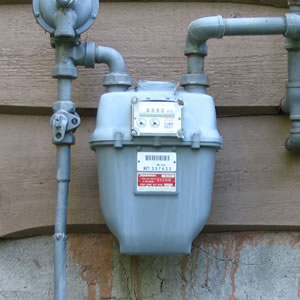 Have you ever been wandering around your home and catch a hint of rotten egg? That means one of two things: either the kids left food out again or Your House has a GAS LEAK!!!
Have you ever been wandering around your home and catch a hint of rotten egg? That means one of two things: either the kids left food out again or Your House has a GAS LEAK!!!
Don’t panic! Although this is a serious situation, with the proper information and attitude, you will be able to keep your family and home safe from natural gas problems.
What is Natural Gas?
First, however, let’s discuss what natural gas is. Many people think that natural gas is a by-product of oil refining and comes from crude oil. This is close, but not quite right. Natural gas is associated with crude oil because it is often found in the same underground reservoirs where oil is pumped from. Like oil, natural gas is created from the decayed bodies of pre-historic creatures and plants. Time, heat, and pressure eventually transformed some of these remains into coal, others into oil, and lastly into natural gas. All of these products have been mined and used for centuries and are commonly referred to as petroleum products.
Even though Natural Gas is often found with oil and coal, it can sometimes be found in pockets by itself. It sometimes seeps up through the ground and there is no better example of this than the town of Centralia, Pennsylvania where underground Natural Gas has been burning for over 50 years! Most of the time, however, Natural Gas is harnessed and collected for use in your home.
Now let’s return to our previous emergency: Your Gas Leak
Firstly, let’s look at how you know that there is a leak; the rotten egg smell. It is a common misconception that Natural Gas reeks of week old egg, but this is a myth. Natural Gas is actually odorless. In fact, before there were electronic detectors, miners routinely put canaries or rats in cages and hung them up in the mine. As long as the animal was still alive, the miners knew they were safe. If the canary keeled over, it was time to evacuate and pipe some fresh air into the shaft. The foul odor that is associated with Natural Gas is injected into the gas line to provide a method for people to detect a leak without having to sacrifice the family pet.
Once you have caught a whiff of this particular nastiness, you may be tempted to check on appliances that usually use Natural Gas. The most common are furnaces, hot water heaters, and stoves. All of these units usually have safety features designed to prevent leaks. Nonetheless, it still happens from time to time. Maybe the part was faulty. Perhaps the appliances haven’t had proper maintenance. Who knows?
It doesn’t matter.
Don’t go wandering around the house trying to sniff out the source. Immediately round up everyone in the house and get them outside and across the street. Don’t worry about turning off lights or other electronics since the act of flipping switches can create a dangerous spark. Get everyone out! Once you and your loved ones are safe, call the Fire Department and wait until they declare the house safe.
For detailed emergency procedures, visit Xcel Energy’s Emergency Page.
For more information about keeping your family and home safe, please contact your True Performance Real Estate Agent today. We look forward to helping you!
Call: 303-317-6311

